Pregnant women with tooth decay is a very common case today due to many factors both internal and external. Depending on each specific case, when examining, the doctor will instruct the patient to take appropriate specialized measures so as not to affect the health of both mother and baby. However, in the early stages, pregnant women can apply some folk methods at home to reduce the pain caused by tooth decay.
1. Causes of tooth decay in pregnant women
During pregnancy, women will have a higher risk of oral diseases than normal people due to many factors. Some common causes include the following:
1.1. Diets high in sweet or sour foods
During pregnancy, women will experience bloating, feel full faster and also feel hungry more easily due to the narrowing of the stomach to make room for the fetus. At that time, pregnant women often choose to divide their meals into smaller portions to ensure nutrition for the body and fetus or can snack to avoid feeling hungry.
Also during pregnancy, women’s tastes often change, some foods are prioritized such as sweets or sour foods rich in acid. This is one of the reasons that increases the risk of tooth decay in pregnant women.
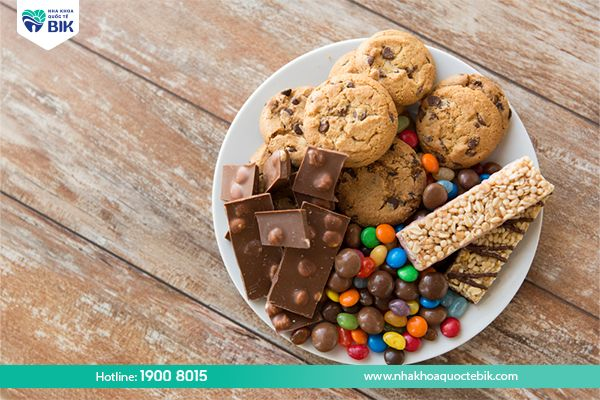
1.2. Lack of necessary calcium
The element that plays the most important role in ensuring the comprehensive development as well as the formation of bones and teeth of the fetus is calcium. During pregnancy, the mother’s calcium needs always increase. Therefore, in order to balance, the body will self-regulate by withdrawing a certain amount of calcium from the teeth and bones and releasing it into the blood to meet the body’s needs. Therefore, when pregnant, not having enough calcium will cause the teeth to weaken, creating conditions for bacteria to attack and cause tooth decay.
1.3. Due to hormonal changes
Many scientific studies have shown that increased accumulation of bacteria and plaque often causes oral diseases, including tooth decay. This phenomenon is directly related to changes in estrogen and progesterone hormones when women are pregnant.
1.4. Due to morning sickness
Hormonal changes during pregnancy can also cause morning sickness, making food in the stomach more likely to reflux into the oral cavity. Feeling nauseous or vomiting will increase acid and bacteria that cause tooth decay in the oral cavity.
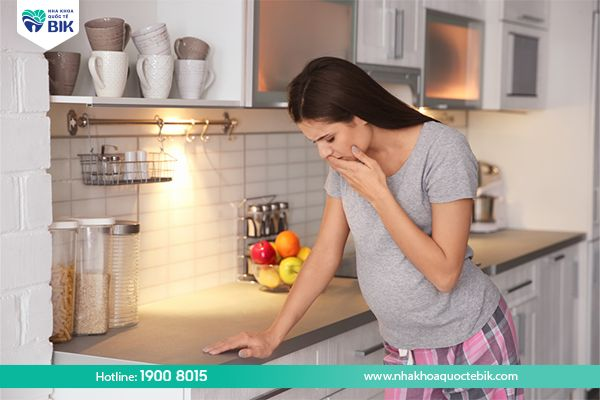
1.5. Improper oral hygiene
Pregnant women often divide their meals into smaller portions throughout the day and have the habit of snacking more, which will make pregnant women lazy or afraid to brush their teeth regularly. In particular, during pregnancy, many pregnant women suffer from bleeding gums, which makes tooth cleaning difficult, thereby increasing the risk of tooth decay.
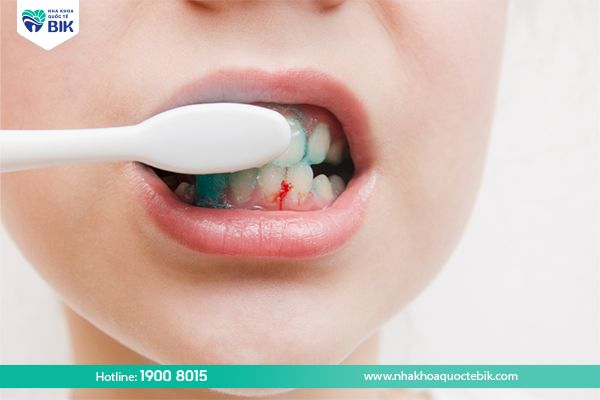
2. How to treat tooth decay in pregnant women
During pregnancy, women can choose some methods to treat tooth decay such as:
2.1. Tooth filling is a safe and effective method
Dental filling without anesthesia is considered a superior treatment method to help pregnant women overcome tooth decay. However, the time when pregnant women can have tooth filling is when the fetus is 4 – 6 months old. Because in the early stages, when the fetus’s organs are developing, strong impacts should be avoided. In the last 3 months, the fetus is fully developed and large, so the mother’s movement should also be limited.
If pregnancy is not suitable for tooth filling, pregnant mothers can refer to ways to treat tooth decay from natural ingredients that will help reduce toothache and are safe for pregnant mothers.
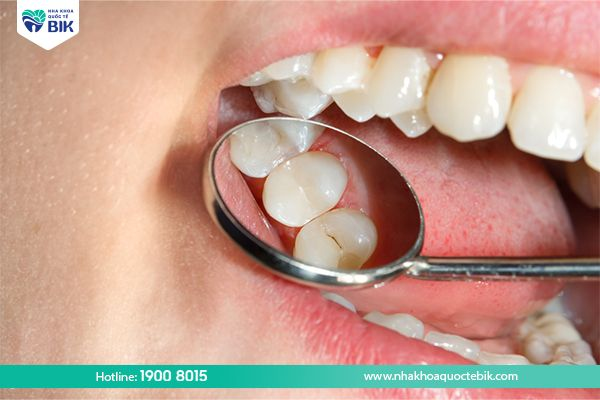
2.2. Treat tooth decay with garlic
Garlic is not only a familiar ingredient in every family kitchen but also an effective medicine to treat tooth decay. Because garlic contains some antibacterial, anti-inflammatory active ingredients and has effective pain-relieving properties.
The usage is also very simple, the owner needs to crush a few cloves of garlic with a few grains of white salt, then apply this mixture to the area with toothache for about 10 minutes. The toothache will be significantly relieved and if you persist in doing it, even mild tooth decay can be cured.
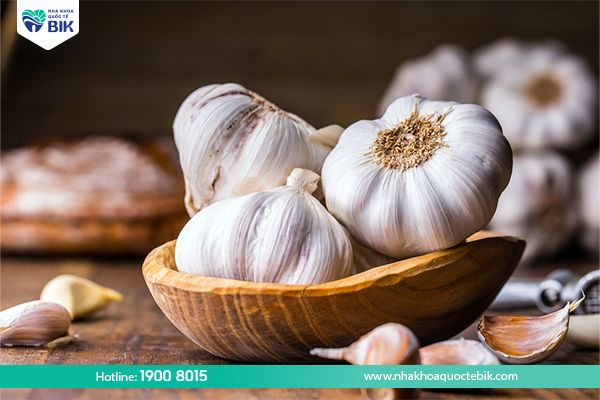
2.3. Treating tooth decay with salt
In addition to its well-known antiseptic properties, warm salt water can also effectively relieve toothache in cases where tooth decay causes pain for pregnant women. This is considered a simple, easy-to-implement measure that pregnant women can apply every day to protect their teeth and mouth.
After brushing your teeth, rinse your mouth with a diluted salt water mixture for 30 seconds. Salt water has the ability to disinfect the oral cavity, reduce sore throat, kill bacteria and protect teeth from bacterial attacks.
Note that the salt water should not be too light or too salty. After rinsing your mouth with salt water, rinse your mouth again with filtered water to wash away all the salt as well as the plaque that has come off during the process of rinsing with salt water.
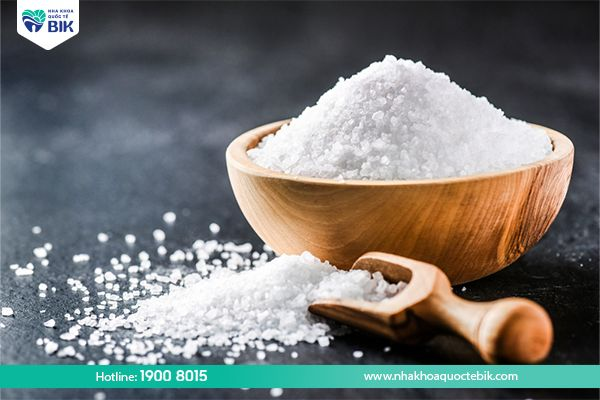
2.4. Treating tooth decay with betel leaves
Treating tooth decay with betel leaves is a method that is little known to many people, however, this is a method that many people have successfully applied. Betel leaves have the ability to inhibit the development of tooth decay and effectively reduce pain.
Because the characteristics of betel leaves are spicy, aromatic and have effective pain-relieving effects. In addition, the stem and betel leaves contain alkaloids and essential oils, the roots of betel leaves contain benzylacetate, all of which are minerals that are very good for teeth and mouth.
Pregnant women can take the whole stem, leaves and roots, boil them to get concentrated water and gargle. If used for about 3 to 4 days, it will inhibit the development of tooth decay and effectively reduce pain.
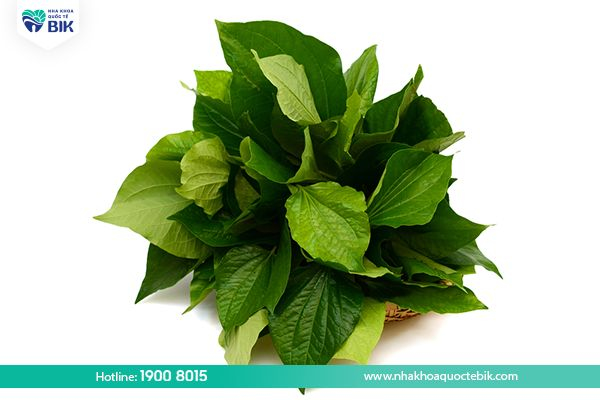
3. How to take care of oral health for pregnant women with tooth decay
– Maintain the habit of brushing your teeth at least twice a day, especially after each meal to completely remove plaque on the tooth surface, avoiding the formation of dense tartar.
– Use a soft-bristled toothbrush, brush your teeth in a circular motion to limit gum damage.
– Note that you should brush your teeth at least once every 3-4 months to avoid bacteria accumulating and causing tooth decay.
– Combine the use of dental floss or a water flosser to completely remove food debris deep in the teeth, where the toothbrush cannot clean.
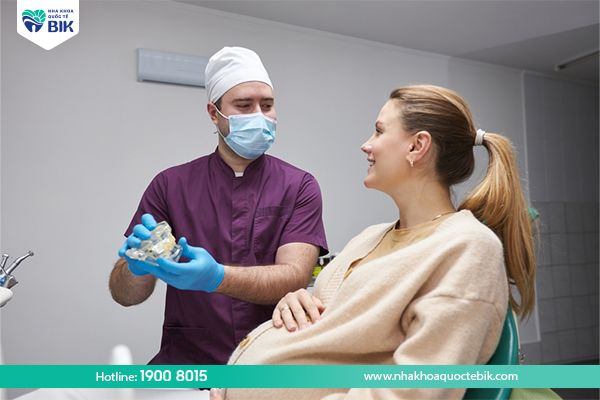
4. Nutrition for pregnant women with tooth decay
The nutritional regimen of pregnant women is especially important during the development of the fetus. If the mother is deficient in nutrients during this period, it can cause the baby’s teeth to be weak and susceptible to tooth decay later. In particular, calcium is good for the development of teeth, creating strong teeth.
Pregnant women need to increase the use of calcium-rich foods such as freshwater crabs, freshwater shrimp, small shrimp, seafood, milk and dairy products (yogurt, cheese, sterilized yogurt, …), black sesame, white sesame, vegetables and fruits (bananas, kiwi, oranges, broccoli, kale, Malabar spinach, water spinach, beans, celery, carrots, …).

So pregnant women have a higher risk of tooth decay due to many different causes. To avoid dangerous effects on the fetus when tooth decay becomes severe later, pregnant women should go to a reputable dental facility for examination and timely treatment advice when noticing even the smallest signs of tooth decay.


















